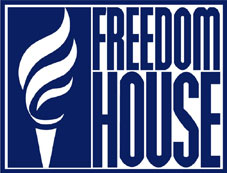
Freedom House releases report on Georgia
By Tea Mariamidze
Friday, May 12
A United States-based non-governmental organization, Freedom House, has released its report on Georgia after publishing its annual report on April 4, which said that the democracy score of Georgia remained unchanged.
The report, Nations in Transit 2017 - The False Promise of Populism, analyzes the development of democracy in 29 countries and Central Europe and Eurasia.
In the ratings, Georgia has a total of 4.61 points out of 7, with 1 representing the highest level of democratic progress and 7 the lowest.
Michael Hikari Cecire, a Fellow at New America, a Fellow at the Foreign Policy Research Institute and the cofounder of the Tbilisi-based Georgian Institute of Politics, is the author of the report about Georgia.
The detailed report reads that throughout 2016, Georgia’s democratic development continued its recent positive trajectory, although progress stalled and even regressed along certain lines.
“The parliamentary elections in October 2016 demonstrated improved administration and regulation of the electoral process, and hard-won gains countering both petty and elite-level corruption appear increasingly institutionalized. Yet while monitors described the elections as mostly free and fair, instances of pre-election and election day violence cast a pall over the process,” the report reads.
The planned changes in the rule of Presidential elections were also covered in the report.
“Proposed constitutional amendments have raised the possibility of ruling GD using the party’s supermajority to change the presidential selection process to an indirect system using a college of electors from the current direct elections,” Freedom House said.
The report also stresses that Russia has increased its influence over Georgia’s breakaway regions with the ratification of a de facto Abkhazian-Russian military agreement that establishes a joint military force and places Abkhazian troops under direct Russian control in wartime. Also, Russia already has a more comprehensive agreement in place with the separatist South Ossetian authorities, which effectively ceded its minor military capabilities to Russian control in a 2015 integration “treaty”.
The report also says that the Georgian media is generally “vibrant, pluralistic, and free,” and international organizations describe media freedom in Georgia as mostly strong, and the media sector benefits from a reasonably robust legal framework and significant pluralism.
“But the ongoing legal dispute over Rustavi 2, the most viewed television station in Georgia, and a brewing ownership dispute at the third-most-watched channel Maestro TV, are holding back further progress,” the report reads.
Moreover, the author of the report said that the functioning of the judiciary has improved since the transfer of power following the 2012 parliamentary elections, but there remain widespread concerns over judicial independence and the operation of the judiciary.
“High-profile court cases continue to raise serious questions about the independence and politicization of the judiciary,” the report reads.
As for the positive trends, the author noted that Georgia has become known as a leader in the non-Baltic former Soviet Union in combating corruption.
However, the report underlines that nepotism remains an area of potential concern.


